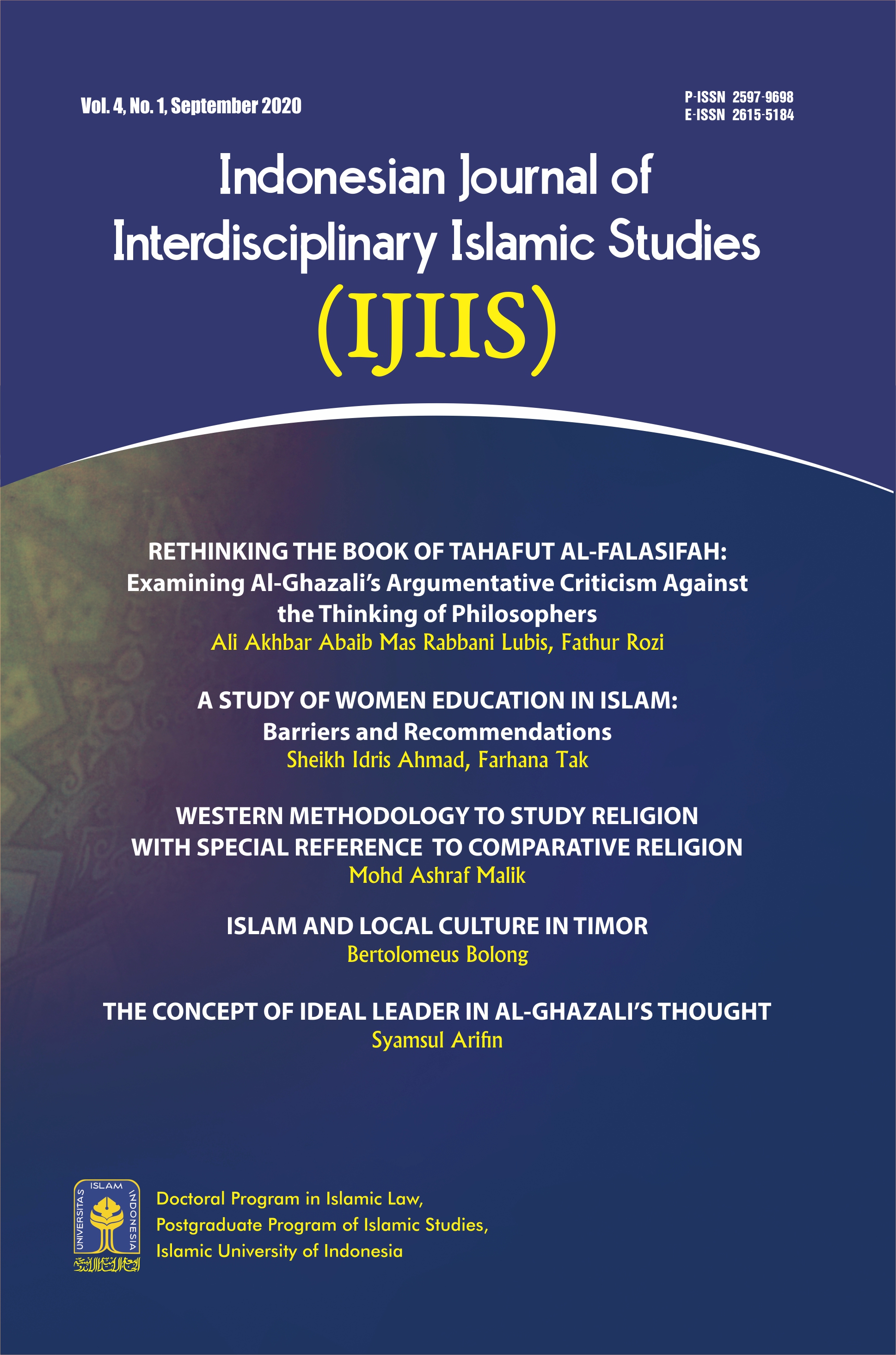Main Article Content
Abstract
According to the Muslims’ belief, Islam is not circumscribed to certain beliefs, customs and rituals. Rather, it encompasses every dimension of human behavior. This makes Islam a unique religion among all living religions of the world. Being comprehensive in nature, a system of life and a vibrant civilization, Islam claims the ability to transform the lives of people and guides them to lead a decent life irrespective of the gender discriminations both at individual and collective levels. This motivation of adopting an excellent and ideal character is deeply rooted in the Islamic emphasis on education or acquisition of knowledge. The first revelation (96:1-5) and the famous prophetic saying that “The gaining of knowledge is an obligation upon every Muslim” (Ibn Majah) are best illustrations regarding Islamic approach to education. Similarly there are several examples whereby every male and female—without any gender bias—have been equally recommended and encouraged to acquire knowledge. Not only the divine text but Islamic history also witnessed that during the period of the Messenger, in addition to men, women were not only encouraged to gain knowledge but many women companions of the Messenger excelled in different disciplines of the time including sciences of Quran, Hadith, Fiqh, Medicine, and Poetry. Notwithstanding this, in the contemporary times there is a glaring and a growing misconception that Islam by promoting gender bias stops the women from the knowledge acquisition opportunities. In this context, the current paper is a humble effort to understand the position of the Messenger vis-à-vis the education of the women. With the help of historical facts, the paper will also highlight the splendid achievements of the women in the field of education in the days of the Messenger and subsequent period. Further, the study will examine the barriers and reasons responsible for discouraging women education; followed by certain recommendations.
Keywords
Article Details

This work is licensed under a Creative Commons Attribution-ShareAlike 4.0 International License.
References
- Abidi, Azra., “Educational Marginalization of Muslim Girls: A Study on the Role of State and Religion”, IQSR Journal of Research & Method in Education, 5: 4, 2015.
- Akhter, Firdousa., “Role of Muslim Women in the Development of Hadith Literature: An analysis to Some Important Aspects”, Insight Islamicus, Vol. 9, 2009.
- Alam, Zafar., Islamic Education Theory and Practice, New Delhi: Adam Publishers and Distributors, 2003.
- Ali, Parveen S., Human Rights in Islam, New Delhi: Adam Publishers and Distributors, 2010.
- Ansari, Maulana Syed., Siyar al-Sahabiyat, Azamgarh: Darul Musannifin Shibli Academy, 2001.
- Biswas, Ranjita., “Higher Education for Muslim Women Empowerment in India”, International Journal of Scientific Research and Education, 4: 8, 2016.
- Hibri, Azizah al-., “Islam, Law and Custom: Redefining Muslim Women’s Rights”, American University International Law Review, Vol. 12, Issue 1, 1997.
- Islam, Badrul., Educational Foundations of Islam, New Delhi: Adam Publishers and Distributors, 2009.
- Islam, Mohammad Saiful., “Importance of Girl’s Education as Right: A Legal Study from
- Islamic Approach”, Beijing Law Review, July 2016.Ibn Majah, Book 1
- Johannes, Eliza., “Women’s Education in Sub-Saharan Africa: Obstacles facing Women and Girls Access to Education: The Case of Kenya”, Kenya Studies Review, 01: 02, 2010.
- Khan, Sumaira Taj-., “Islam and Girls Education: Obligatory or Forbidden”, Cultural and Religious Studies, 4: 6, 2016.
- Maududi, Maulana Abul Ala al-, Pardah, New Delhi: Markazi Maktaba-i Islami Publishers, 2001.
- Pertek, Sandra., “Beyond the Stereotypes: Muslim Women and education. Barriers in access to Education and Alternative solutions for…”, Research Gate, University College London, April 2012.
- Tufail, Mohammad., (ed.), Naqush Ka Rasul Number, New Delhi: Data Book Depot, 1983.
References
Abidi, Azra., “Educational Marginalization of Muslim Girls: A Study on the Role of State and Religion”, IQSR Journal of Research & Method in Education, 5: 4, 2015.
Akhter, Firdousa., “Role of Muslim Women in the Development of Hadith Literature: An analysis to Some Important Aspects”, Insight Islamicus, Vol. 9, 2009.
Alam, Zafar., Islamic Education Theory and Practice, New Delhi: Adam Publishers and Distributors, 2003.
Ali, Parveen S., Human Rights in Islam, New Delhi: Adam Publishers and Distributors, 2010.
Ansari, Maulana Syed., Siyar al-Sahabiyat, Azamgarh: Darul Musannifin Shibli Academy, 2001.
Biswas, Ranjita., “Higher Education for Muslim Women Empowerment in India”, International Journal of Scientific Research and Education, 4: 8, 2016.
Hibri, Azizah al-., “Islam, Law and Custom: Redefining Muslim Women’s Rights”, American University International Law Review, Vol. 12, Issue 1, 1997.
Islam, Badrul., Educational Foundations of Islam, New Delhi: Adam Publishers and Distributors, 2009.
Islam, Mohammad Saiful., “Importance of Girl’s Education as Right: A Legal Study from
Islamic Approach”, Beijing Law Review, July 2016.Ibn Majah, Book 1
Johannes, Eliza., “Women’s Education in Sub-Saharan Africa: Obstacles facing Women and Girls Access to Education: The Case of Kenya”, Kenya Studies Review, 01: 02, 2010.
Khan, Sumaira Taj-., “Islam and Girls Education: Obligatory or Forbidden”, Cultural and Religious Studies, 4: 6, 2016.
Maududi, Maulana Abul Ala al-, Pardah, New Delhi: Markazi Maktaba-i Islami Publishers, 2001.
Pertek, Sandra., “Beyond the Stereotypes: Muslim Women and education. Barriers in access to Education and Alternative solutions for…”, Research Gate, University College London, April 2012.
Tufail, Mohammad., (ed.), Naqush Ka Rasul Number, New Delhi: Data Book Depot, 1983.
